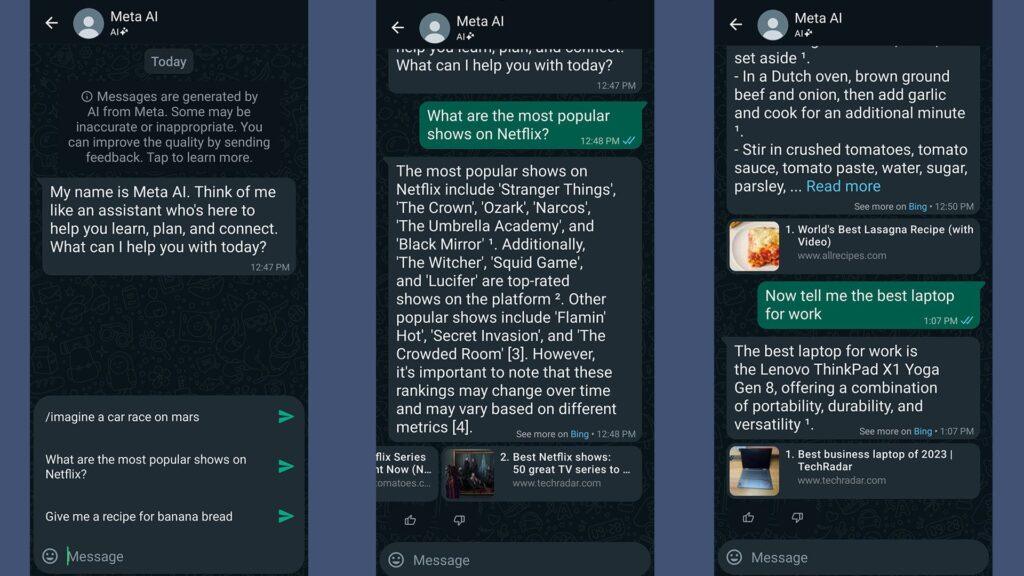- Meta to ban all third-party general-purpose AI chatbots, such as ChatGPT and Perplexity, from WhatsApp in January
- Users will be forced to migrate to other platforms unless they switch to Meta AI
- The move aims to reduce strain on the infrastructure, but also gives more power to Meta’s AI assistant and more data to the company.
Meta is closing the door on third-party AI assistants within WhatsApp. Starting January 15, 2026, no general-purpose AI chatbots, including ChatGPT, Perplexity, and others, will be able to operate on the platform. The change is part of an update to WhatsApp’s Business API policy that prohibits developers of “large language models, generative AI platforms, or general-purpose AI assistants” from accessing the system.
In layman’s terms, Meta is crashing the world’s largest messaging app to ensure that the only chatbot you’ll find inside is Meta AI.
For a company that spent the last year integrating its Meta AI into every corner of its products, this isn’t too surprising. WhatsApp is a huge platform for Meta to test AI ideas, and hosting a variety of third-party chatbots means that not everyone turns to Meta AI for help.
But all those other robots will now have to pack up and leave.
WhatsApp has over three billion users, making it one of the most valuable gateways to consumer AI imaginable. Allowing third-party assistants to thrive within it essentially gave competitors like OpenAI access to Meta’s user base, bypassing Meta’s own monetization plans. Now, by closing the door, the company ensures that Meta AI will be the only chatbot with native reach within WhatsApp, Instagram and Messenger.
Meta claims it’s all about infrastructure, saying in a statement that these chatbots put pressure on the platform due to the high volume of messages and the support needed to maintain them. It’s unclear if that’s true, given that companies that use AI for customer service, such as banks, airlines and digital retailers, will not be affected.
WhatsApp’s new policy effectively consolidates a one-app, one-assistant strategy, which could cause problems for those who like to use multiple apps on a single platform. For millions of users who discovered ChatGPT or Perplexity through WhatsApp, the ban means a significant change in the way they access those assistants.
Starting next year, they will need to use standalone apps or websites instead of chatting within their daily messaging. OpenAI, at least, seems to take the news with a touch of humor.
Meta changed their policies so that 1-800-ChatGPT will not work on WhatsApp after January 15, 2026. Fortunately, we have an app, website, and browser that you can use to access ChatGPT.October 22, 2025
Meta AI’s data pipeline gives the company many incentives to keep conversations internal. Every conversation that happens with Meta AI is another opportunity to refine recommendations and personalize ads. Conversations that occur with external attendees, on the other hand, are interactions that Meta cannot analyze or monetize.
And Meta’s framing isn’t necessarily entirely false. The WhatsApp Business API was built, as the name suggests, for transactions, not general chats. AI assistants blur the line between business and personal use.
Still, the policy is written broadly enough that Meta retains full discretion in defining what qualifies as “general-purpose AI.” That means you could theoretically block future apps that you deem competitive or out of your comfort zone, even if they serve a legitimate use case.
Meta’s takeover isn’t unique either. Google integrated Gemini into its search and productivity apps, Apple has been working with OpenAI to bring ChatGPT to Siri, and Amazon uses Alexa as a gateway to its business empire. What’s different about Meta’s approach is WhatsApp’s sheer scale and Meta AI’s lack of opt-out. You can’t even turn off the chatbot.
There are fewer options for users who prefer different assistants and fewer opportunities for competitors to reach them. Imagine if all email apps banned third-party filters except the one created by the host company. That’s more or less the model Meta is heading towards with WhatsApp.
But if Meta can win with a strategy of owning the chat, owning the assistant, owning the ecosystem, it will probably be worth it for its bottom line. WhatsApp will be Meta AI’s personal playground, and any other AI there will only last as long as the company chooses.
Follow TechRadar on Google News and add us as a preferred source to receive news, reviews and opinions from our experts in your feeds. Be sure to click the Follow button!
And of course you can also follow TechRadar on TikTok for news, reviews, unboxings in video form and receive regular updates from us on WhatsApp also.




